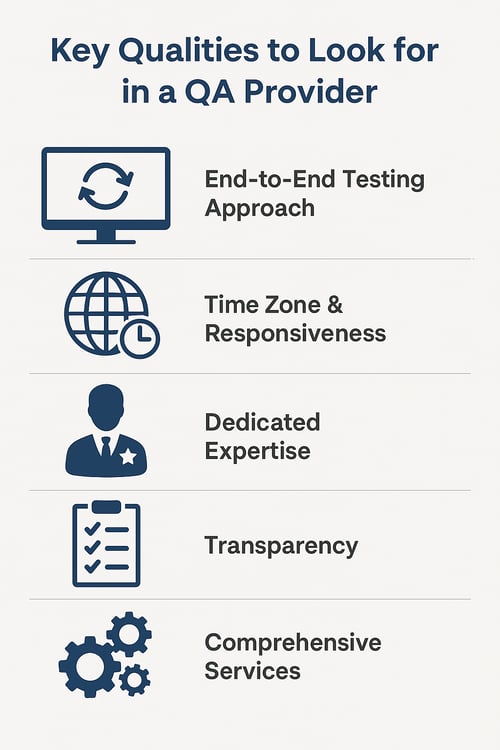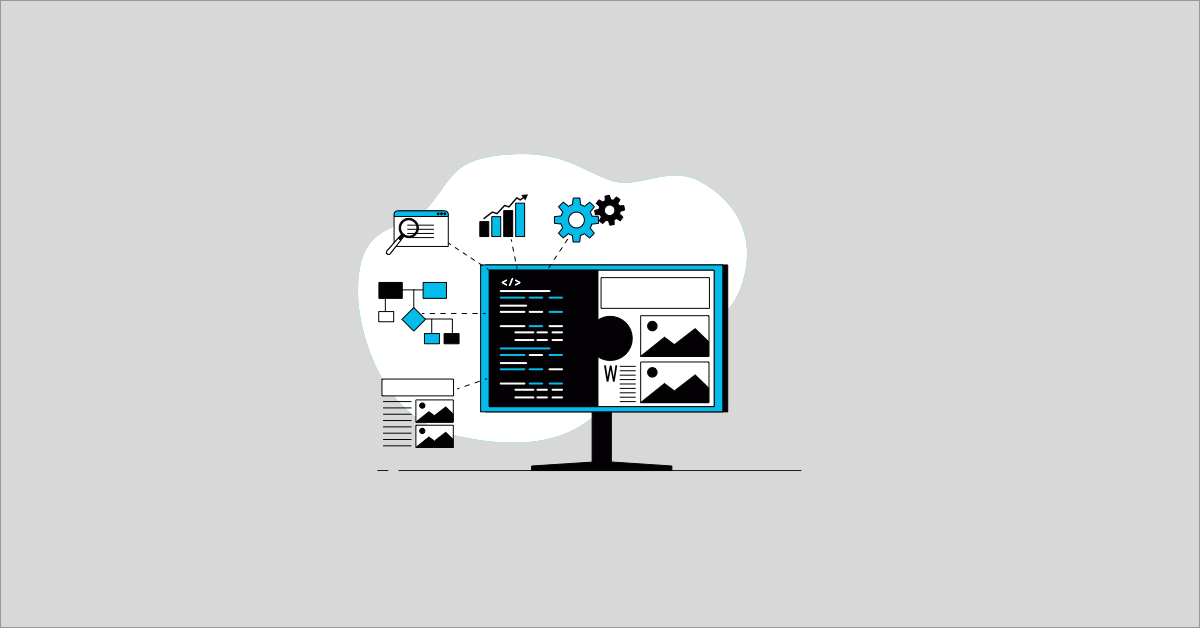One bug in production can break trust, trigger churn, or bring your roadmap to a halt. QA bottlenecks slow everything, from releases to user satisfaction. That’s why more product teams are turning to managed QA services, a model where an external partner owns testing end-to-end, to catch bugs early and keep features flowing.
But not all QA companies are created equal. Some miss critical issues. Others flood you with noise. The right partner blends precision, speed, and seamless collaboration.
Here are 8 of the best managed QA companies in 2026. Whether you're a startup or scaling enterprise, these providers can help you deliver high-quality software faster.
What is a managed QA service?
A managed QA service is an outsourced testing model where an external partner owns quality end to end — from test strategy and automation to execution and maintenance — so product teams can ship faster without building an internal QA function. In practice, this means QA becomes a continuous, owned function rather than a short-term testing task.
Key Takeaways
-
QA bottlenecks slow growth; great QA companies accelerate it. Managed quality assurance services help fast-moving teams catch bugs early, reduce release friction, and protect product quality without overwhelming internal devs.
-
Not all QA service providers are created equal. The best QA companies offer a balance of strategy, speed, automation, and human insight. Key traits to look for include real-user testing, transparent reporting, embedded QA experts, and no vendor lock-in.
-
MuukTest leads with AI-powered testing and hands-on strategy. With fast onboarding, self-healing automation, and QA architects embedded in your workflow, MuukTest is ideal for teams that want coverage without hiring overhead.
-
From startups to enterprises, these 8 QA firms cater to different needs. Whether you need mobile testing, offshore teams, no-code automation, or regulated industry support, this guide compares the top QA testing companies of 2026 so you can choose the right partner for your roadmap.
Key Qualities to Look for in a Managed QA Partner
Before we dive into the top software testing companies in 2026, consider these 5 factors when evaluating a QA testing provider:

-
End-to-End Testing Approach: Do they test from a real user perspective (i.e., the UI), or only at the code level? Favor companies that can validate the actual user experience, catching visual or workflow bugs that code-centric tests might miss.
-
Time Zone & Responsiveness: Will the testing team work in your time zone or provide quick turnaround? Delayed communication can slow down your release cycle, so choose a QA service that aligns with your working hours for fast feedback.
-
Dedicated Expertise: Do you get a dedicated QA team or point of contact who learns your product? A consistent team that thoroughly understands your application will require less oversight and identify issues more quickly, acting as an extension of your in-house team.
-
Transparency: What level of visibility do you have into the testing process and results? The best QA companies provide access to test cases, live results, and detailed reports, avoiding the “black box” feeling. You and your developers should be able to understand what’s being tested and easily view bug reports.
-
Comprehensive Services: Can they handle both automated and manual testing as needed? Automation is great for speed and scale, but manual exploratory testing by human experts is crucial for usability and finding edge cases. A well-rounded QA partner offers a comprehensive range of testing services, ensuring you get the right mix for your stage and goals.
Now, with those criteria in mind, let’s look at eight of the best QA testing companies in 2026 and what each can offer.
Top 8 Managed Quality Assurance Providers in 2026
The QA landscape is filled with options, from boutique firms to global consultancies. But not every company is built to support fast-paced, high-growth teams. Based on service quality, innovation, and customer feedback, here are the best 8 managed QA providers worth considering in 2026.
Below is a side-by-side comparison of leading managed QA providers, showing who they’re best for, their core services, and what sets each apart.
| Company | Best For | Key Services | Strengths |
|---|---|---|---|
|
MuukTest
|
Fast-scaling teams needing AI-driven, fully managed QA
|
AI automation, QA strategy, CI/CD integration, Parallel testing
|
Fast onboarding, no-maintenance, QA architects' oversight AI
|
|
Testlio
|
Mobile-first teams, real-device testing at scale
|
Mobile/web testing, QA leadership, crowdtesting
|
Global testers, device variety, flexible staffing
|
|
QA Mentor
|
Enterprises needing broad QA coverage + flexibility
|
Functional, automation, security, audits
|
30+ services, consulting, flexible models
|
|
DeviQA
|
SaaS teams needing embedded QA engineers
|
Automation, manual, performance, staff augmentation
|
Agile fit, test strategy help, strong communication
|
|
QASource
|
Enterprises scaling QA via offshore teams
|
Functional, API, automation, security
|
Cost-effective, offshore staffing, mature process
|
|
QualityLogic
|
Accessibility and standards-focused QA
|
WCAG audits, interoperability, functional testing
|
Onshore testing, accessibility leadership, legacy system expertise
|
|
Rainforest QA
|
Agile teams wanting no-code automation + manual testing
|
No-code tests, human testers, CI/CD integrations
|
No-code interface, 24/7 crowd testing, detailed video-based reports
|
|
QA Wolf
|
Teams wanting fully managed E2E test automation
|
Playwright automation, unlimited runs, test dashboards
|
Zero setup, fast automation coverage, 24-hour maintenance SLA
|
1. MuukTest
Best for fast-scaling teams that need AI-powered automation, hands-on QA strategy, and reliable test coverage without building an in-house QA team.
Overview
MuukTest provides a fully managed QA-as-a-Service solution tailored for startups, scale-ups, and enterprise teams that want to move fast without sacrificing software quality. Their hybrid model combines an intuitive no-code platform with QA architects who handle test strategy, execution, and maintenance on your behalf.
Services Offered
-
Functional, regression, and end-to-end testing (web, mobile, API)
-
Custom test planning and test case design
-
AI-powered automated test creation with self-healing scripts
-
CI/CD integration and test environment simulation
-
Real-time reporting with detailed bug reproduction and analytics
Strengths
-
Fast onboarding: Get automated coverage in 90 days or less
-
Scalable automation: Create, update, and execute hundreds of tests without managing infrastructure
-
Strategic QA partnership: Dedicated QA leads collaborate directly with your team
-
AI-powered efficiency: Reduces test flakiness and maintenance overhead
Best For
CTOs and engineering teams who want:
-
Full QA coverage without hiring internally or with small teams
-
A clear path to automated testing even without prior QA infrastructure
-
Tight feedback loops with a responsive, embedded QA team
-
A flexible engagement model that adapts as they grow
Standout Feature
MuukTest’s platform auto-generates and self-heals test cases using AI, running them in parallel across environments. This catches bugs earlier without overloading your developers or inflating costs.
Why MuukTest Is a QA Partner, Not Just a Vendor
At MuukTest, QA is designed to fuel your team’s momentum, not slow it down. Our hybrid approach blends smart automation with expert QA talent to accelerate delivery, surface actionable insights, and improve coverage without the hiring overhead.
Why Teams Choose MuukTest
-
Fully-managed QA: We design, build, execute, and maintain your tests from end to end. No flaky scripts, no technical debt.
-
Smart automation: Our AI platform auto-generates and self-heals tests to reduce upkeep and ensure stability.
- No lock-in: Test scripts are portable and exportable, so you retain full control if your needs change.
-
QA expertise: A senior Project Manager and a QA architect is in communication with your team, aligning closely with your release plans.
-
Actionable insights: Dashboards, video defect logs, and real-time alerts enable fast resolution, no guesswork needed.
What Success Looks Like with the Right QA Service
Here’s how MuukTest helps teams move faster with fewer bugs and clearer processes:
- Pienso (ML workflow tooling): Over just a few months, Pienso achieved 85% test coverage, uncovered 28 latent defects in early phases, and established a repeatable QA foundation all without adding internal headcount.
-
Slope (actuarial software): Within 90 days, we delivered 203 automated tests, slashed execution time from 12 hours to 75 minutes, and freed their developers to focus on core computation logic.
-
Spiffy (on-demand services platform): MuukTest crafted 251 automated tests in 90 days, surfacing 20 previously hidden defects and shutting down quality bottlenecks amid rapid growth.
-
Counter Tools (non-profit health software): In just 3 months, we automated 132 tests (reaching 194+ ongoing), uncovered 18 early-stage bugs, and trimmed regression execution to under 2 hours weekly freeing 40 hours of manual QA time.
MuukTest is ideal for organizations that:
-
Need dependable QA without internal hiring
-
Want to reduce regression risk as they scale
-
Seek tighter QA-dev collaboration inside agile teams
-
Value transparency, speed, and security
Whether you're shipping your first MVP or scaling across markets, MuukTest helps ensure quality never slows you down.
2. Testlio
Best for mobile-first companies needing real-device testing and flexible global QA teams.
Overview
Testlio combines a global crowdtesting network with dedicated QA teams and strategic oversight. Their platform supports mobile, web, and API testing across real devices and regions with enterprise-grade scalability.
Key Services
-
Functional and exploratory testing
-
Real-device and environment testing
-
QA strategy, planning, and analytics
-
Manual + automated testing support
3. QA Mentor
Best for enterprises and mid-size teams needing a full-service QA partner with deep domain expertise.
Overview
QA Mentor is a comprehensive QA firm offering over 30 testing services, including functional, automation, security, and compliance testing. They’re known for flexibility and wide technical scope.
Key Services
-
Manual, automated, performance testing
-
QA audits and consulting
-
Mobile, desktop, and enterprise systems
-
Dedicated or on-demand QA resources
4. DeviQA
Best for agile SaaS teams that want embedded QA engineers and test automation support.
Overview
DeviQA offers dedicated QA teams and test automation to fit directly into your product cycle. They specialize in scalable automation and sprint-aligned collaboration.
Key Services
-
Automation and manual testing
-
QA team augmentation
-
Performance and cross-browser testing
-
CI/CD and DevOps test support
5. QASource
Best for companies scaling QA with reliable offshore teams and enterprise-level support.
Overview
QASource delivers dedicated offshore QA teams and full-service testing for companies needing cost-effective scale. They integrate with enterprise SDLCs and cover a wide range of services.
Key Services
-
Functional, automation, and API testing
-
Dedicated QA staffing
-
Localization, security, and accessibility testing
-
CI/CD pipeline integration
6. QualityLogic
Best for organizations requiring precise, standards-based testing, especially for accessibility and interoperability.
Overview
QualityLogic is a U.S.-based QA company with decades of experience in regulated, technical, and legacy system environments. They’re known for accessibility and WCAG testing expertise.
Key Services
-
Functional, regression, and interoperability testing
-
Accessibility audits (WCAG/ADA)
-
Usability, mobile, and performance testing
-
Custom test tool development
7. Rainforest QA
Best for startups and product teams needing fast, no-code testing with on-demand manual support.
Overview
Rainforest QA offers a no-code test automation platform paired with a global network of human testers. Teams can create functional UI tests in plain English and run them in parallel across cloud environments without writing code or maintaining infrastructure.
Key Services
-
No-code UI test automation
-
Manual exploratory testing
-
Test scheduling and CI/CD integration
-
Video-based bug reports and dashboards
8. QA Wolf
Best for fast-moving teams that want fully managed end-to-end test automation without lifting a finger.
Overview
QA Wolf delivers 100% done-for-you test automation using Playwright. Their team writes, runs, and maintains your tests, offering fast coverage and 24-hour test fixes so your engineers stay focused on shipping.
Key Services
-
End-to-end test automation
-
Unlimited test runs in the cloud
-
Dashboards, logs, and video replays
-
Dedicated QA team support
Conclusion
Choosing the right QA partner can make a huge difference in your team’s velocity and product quality. All the companies above have something to offer, but the best choice depends on your needs – whether it’s speed, scale, domain expertise, or a hands-off solution.
By focusing on quality early and partnering with the right QA service, you can release software with confidence and speed. MuukTest stands out for fast-growing teams that need a balance of powerful no-code automation and expert guidance.
Interested in learning more about MuukTest’s approach? Book a call with our team to discover how we can enhance your QA, or visit our website for case studies and additional information.
Let’s make testing one less thing your team has to worry about.
Frequently Asked Questions
What are managed QA services?
Managed QA services are designed for teams that want consistent quality without managing testing internally. Instead of handing off individual tasks, the provider owns the test strategy, automation, execution, and ongoing maintenance. This creates a stable, continuously improving QA process without the need to build or manage an internal team.
How are managed QA providers different from a traditional QA testing company?
Many QA vendors focus on short-term execution or hourly work. A managed approach is designed for continuity. The same team defines your quality strategy, builds and maintains automation, and adapts coverage as your product evolves. This long-term ownership reduces gaps, flaky tests, and constant re-onboarding between releases.
Why do companies choose managed quality assurance services instead of in-house QA?
For fast-moving teams, hiring and ramping QA internally often slows things down before it helps. An external QA partner brings established processes, experienced testers, and ready-to-use automation without long lead times. Development continues at speed while quality is handled in parallel, not as a bottleneck.
How much does a fully managed QA solution typically cost?
Pricing varies based on complexity, coverage goals, and release frequency, but most teams can expect predictable monthly pricing rather than hourly billing.
-
Managed QA services typically range from $4,000 to $8,000 per month
-
Pricing usually includes test strategy, automation, execution, and maintenance
-
Many providers offer pilots or phased onboarding to validate fit
Compared to hiring even one full-time QA engineer, managed QA services are often more cost-effective and faster to deploy.
What does a managed QA engagement usually include?
A typical engagement covers the entire testing lifecycle, such as:
-
Test planning and quality strategy
-
Manual and automated functional testing
-
Regression and release validation
-
API, mobile, and cross-browser testing
-
CI/CD integration and reporting
-
Ongoing test upkeep as features change
The defining factor is accountability: one team is responsible for maintaining high quality over time.
Is this approach a good fit for fast-scaling product teams?
Yes. Teams that release frequently often outgrow ad-hoc testing quickly. A managed setup provides structure without slowing development, helping teams catch issues earlier and stabilize releases as complexity increases. This is especially valuable once customer workflows become more complex and regressions carry higher risk.
How quickly can an external QA partner get started?
Most QA services can begin within 1–2 weeks. Initial onboarding typically starts with exploratory testing to understand the product, followed by defining the test strategy and planning automation. With proper access and documentation, experienced providers, like MuukTest, can achieve meaningful test coverage within 4–6 weeks, while continuously expanding coverage as development continues.
Will they work with our existing tools and workflows?
Yes. Most providers integrate directly into your existing setup, including issue trackers, repositories, and CI/CD pipelines. Some also bring their own tooling to improve visibility and reporting. Either way, your team retains access to test results and quality metrics without changing how you work.












